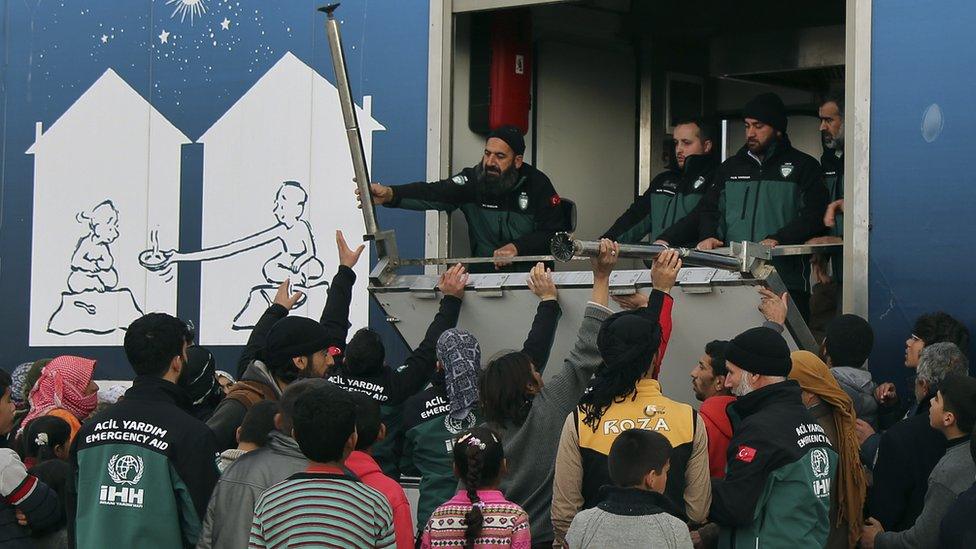Syria refugee camps set up as Turkey limits entries
- Published
'No more capacity' for Syrian refugees in Turkey
Turkish aid workers have been setting up tents and distributing supplies for thousands of new Syrian refugees kept from entering Turkey at the border.
Some 35,000 people fled a Syrian government offensive in the Aleppo area last week, trying to enter Turkey's Kilis border region.
But Turkey has so far closed the border to most of them despite appeals by EU leaders to let them cross.
The country already shelters more than 2.5 million refugees from Syria's war.
Many Syrians have gone on to seek asylum in the EU and made up the largest group among more than one million refugees and other migrants who entered illegally last year, mainly by sea from Turkey.

Analysis: Mark Lowen, BBC News, near Turkey-Syria border
Turkey is trying a balancing act between providing sanctuary to those fleeing Syria's war and reducing the numbers of refugees travelling to Europe.
You hear it in Deputy Prime Minister Numan Kurtulmus's words. "Turkey has reached its capacity to absorb refugees," he said, "but we will still take them in."
It is a confused situation and the 35,000 stopped from crossing into Turkey are feeling the effect. Heavily injured people are coming across, those we spoke to saying Turkey must open the border.
The EU is also giving mixed messages, calling one day for Turkey to allow in those fleeing persecution but the next voicing frustration that Turkey is not doing enough to stem the refugee flow to Europe. Germany's Chancellor Angela Merkel will be in Ankara on Monday to talk it through. It could be a messy discussion.

In the past few days, the Syrian army - backed by Russian air strikes - has made a series of gains around Aleppo, Syria's largest city.
Aid officials at the Oncupinar border crossing told Reuters news agency their efforts for now were focused on getting aid to the camps on the Syrian side of the border.
"We're extending our efforts inside Syria to supply shelter, food and medical assistance to people," an unnamed official from the Turkish Humanitarian Relief Foundation said.

"We are already setting up another camp. At the moment all our preparations are to make sure these people are comfortable on the Syrian side of the border."
The agency found a mix of old and newly erected tents at a camp at Bab al-Salama, inside Syria and across from Oncupinar.
EU must act as Syrian refugee crisis worsens says the UN representative on migration.
One refugee, Mouhammed Idris, told Reuters: "We came to the camps with children, including [those] only a month old. We are turning to Turkey where there is safety and no bombing.
"In the beginning [Turkish President] Recep Tayyip Erdogan told the Syrians that he was their brother. He shouldn't desert them, he should open the doors, he should go back to helping them. Now all these people have nowhere to go. Where are we supposed to go? They can't go back to their homes."

Refugees have been receiving aid from the Turkish Islamic aid group IHH
Mr Erdogan said on Saturday that Turkey was ready to open its gates to Syrian refugees "if necessary".
EU foreign policy chief Federica Mogherini said this weekend that Turkey had a moral, if not legal, duty to provide protection.
She said the EU was providing funding to Turkey to make sure it had the "means, the instruments, the resources to protect and to host people that are seeking asylum".
In November, the EU clinched a deal with Turkey, offering it €3bn (£2.3bn; $3.3bn) to care for Syrian refugees on Turkish soil.
About 4.6 million people have fled Syria since the civil war began in 2011. Another 13.5 million are said to be in need of humanitarian assistance inside the country.
On Thursday, 60 donor countries meeting in London pledged billions of dollars to ease the plight of Syrian refugees.

The Syrian war and Aleppo

March 2011: Anti-government protests erupt across Syria, but Aleppo is initially untouched as a result of a state crackdown
February 2012: As the rebellion turns into a conflict, clashes between rebels and the government are reported with increasing frequency in Aleppo province
July 2012: The battle for Aleppo begins. Rebels make swift advances, but are unable to consolidate their gains and the city becomes divided
2013: The government begins bombarding rebel districts with barrel bombs, causing thousands of casualties
September 2015: Syria launches a fresh offensive in the wake of Russia's intervention in the conflict
February 2016: The government captures towns north of Aleppo, threatening to encircle the city
